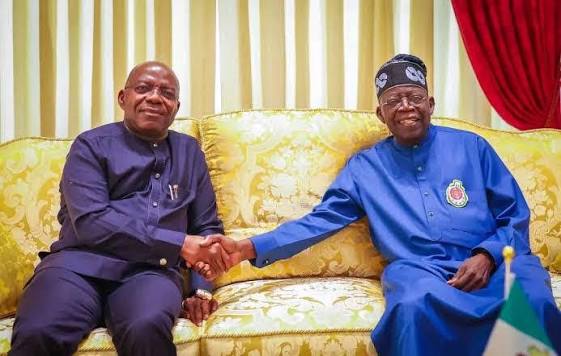

Nigerian music video director ThankGod “TG” Omori has once again found himself at the center of a heated social media firestorm after publicly condemning same-sex relationships, triggering a wave of criticism, backlash, and fierce online debate. What began as a single post from the acclaimed filmmaker quickly escalated into one of the most polarizing conversations on Nigerian social media this week, drawing sharp reactions from fans, creatives, activists, and fellow commentators.
Omori, who is known for shaping the visual identity of contemporary Afrobeats through high-budget, cinematic music videos, ignited the controversy when he wrote on X (formerly Twitter): “Having same gender sex is evil.” The statement, blunt and direct, circulated widely within minutes, attracting thousands of comments and reposts. While his supporters cheered him on, a large section of the public condemned the remarks as discriminatory, insensitive, and out of touch, especially coming from a public figure in 2025.
One of the strongest early responses came from a user who goes by Uche, who announced he would boycott any music video directed by Omori from now on. “Any song Ayra Starr does a video with TG Omori from today I won’t listen. Same with every other Nigerian artiste,” he declared. His comment quickly gained traction, embodying the frustration of fans who believe entertainers and creatives should use their platforms responsibly rather than engaging in rhetoric that could foster stigma or discrimination. Omori, however, was not moved. His reply was sharp, sarcastic, and unapologetic: “Lmao why? Because I said opening YOUR NASH for another MAN to insert a penis is evil?”
The director’s response, far from calming the situation, fanned the flames. Social media users accused him of crude language and incendiary commentary, questioning why he felt compelled to repeatedly reaffirm his views with graphic descriptions. Others argued that his statements reflected wider societal tensions about sexuality in Nigeria, a country where LGBTQ+ rights remain a deeply contentious topic.
Another user, Uncle Emeka, weighed in, highlighting the implications of Omori’s words given his public status. “Tweeting against queer people in 2025 as a public figure is a choice,” he wrote, emphasizing that the director’s decision to speak out—knowing the likely backlash—was an intentional act. But Omori fired back just as aggressively as before: “I Dey fear you?!” His response, characteristically bold, signaled that he had no intention of backing down or softening his stance.
As the debate intensified, some users attempted to inject humor or philosophical reflection into the thread. A commenter using the handle avant garde noted, “Person say you dey use your extra life judge people,” implying that Omori was speaking from a place of self-appointed moral superiority. But again, the director leaned into the critique rather than away from it. “I Dey use Extra life Warn people,” he responded, presenting himself as someone delivering moral caution rather than judgment.
The clash took another turn when user Miles called him a “serial waffler,” an accusation suggesting inconsistency or attention-seeking. But TG Omori seemed ready for this too, responding with a warning that he planned to escalate his outspokenness rather than retreat from it. “Better block me in advance. From Monday morning I’ll start reminding you all the uncomfortable truths everyone needs to hear according to the scripture one after the other. Get some waffles and soy milk.”
For some observers, this final message was the clearest indication that Omori sees his statements as part of a broader moral or religious mission, one he is ready to pursue more aggressively in the coming days. The reference to “scripture” particularly stood out, suggesting that he is framing his views as rooted in religious belief rather than mere personal opinion. While many Nigerians share conservative religious values, others criticized the attempt to use faith as a justification for public condemnation of an already marginalized group.
Across the entertainment industry, the conversation has raised uneasy questions about the intersection of personal beliefs, public influence, and artistic responsibility. Some argue that creatives should be free to express their views, even when controversial, while others insist that such freedom does not extend to speech that could harm vulnerable communities. The tension reflects broader global debates over whether public figures should face consequences for expressing anti-gay sentiment in an era of increased visibility and advocacy for LGBTQ+ rights.
For younger fans, particularly those who identify as queer or who have friends and loved ones in the LGBTQ+ community, Omori’s remarks felt jarring and unnecessary. They echoed concerns that such comments from high-profile personalities can reinforce societal stigma, fuel discrimination, or even endanger people in a country where queer identities are already criminalized and deeply misunderstood. Online communities quickly mobilized to counter his statements, with some tagging human rights organizations or urging brands and artists to reconsider partnerships with him.
However, there were also voices defending Omori, praising him for “speaking his truth” or refusing to be intimidated by online outrage. These supporters argued that the backlash is a sign of “cancel culture,” which they believe is increasingly targeting people who express traditional values. They also pointed out that Nigeria remains a predominantly conservative country where many share Omori’s perspective, even if they would not express it as bluntly as he did.
The divide highlights a generational and cultural rift within Nigeria—between those pushing for greater acceptance and human rights, and those who believe that societal norms must be upheld regardless of global trends. TG Omori’s willingness to confront his critics directly and repeatedly has only sharpened these divisions, cementing his role at the center of the storm.
As Monday approaches, all eyes are on his platform to see whether he will follow through with his promise to deliver more “uncomfortable truths.” Some expect a series of fiery posts that could reignite the controversy, while others believe he may shift his tone or attempt to clarify his intentions. Whatever he chooses, the debate he sparked has already set off a chain reaction that goes beyond his personal views, touching on issues of morality, identity, freedom of speech, and the responsibility that comes with influence.
For now, TG Omori stands defiantly amid the backlash, insisting he will say what he believes regardless of the consequences. Whether this strengthens or damages his standing in the entertainment industry remains to be seen, but one thing is clear: his comments have opened yet another chapter in Nigeria’s ongoing cultural conversation—one that is far from over.


